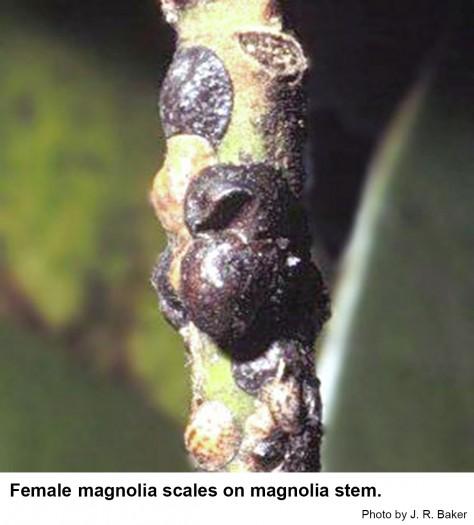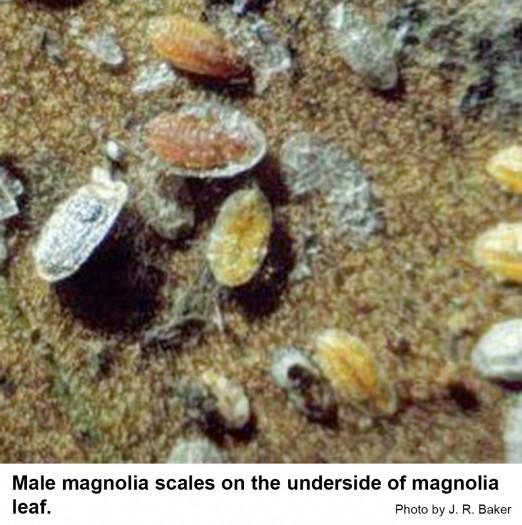Description and Biology
Magnolia scale, Neolecanium cornuparvum, is one of our largest scale insects and is sometimes quite damaging to tulip tree and magnolia. This scale has one generation per year. Its biology is unusual in that the scales reproduce in late summer and the tiny new scales overwinter on the twigs and stems (most of the soft scale insect pests of ornamentals reproduce in May or early June). Male magnolia scales appear in early summer and mate with the females. The females swell considerably with eggs during the summer but the eggs hatch as they are laid so that it appears the crawlers are born rather than hatched.
Host Plants
Infested magnolias and tulip trees may become sticky with honeydew excreted by the scales and black with sooty mold fungi that grow in the honeydew. The overall tree may have sparse foliage and dead branches or the trunks may be distorted because the scales sometimes kill out the leader branches over the years. In addition, most homeowners object to the honeydew and the wasps, flies and bees that are attracted to the honeydew.
Residential Recommendation
If the tree is small enough to be sprayed, fall would be a good time to treat for this pest as the tiny nymphs are exposed on the stems. Spray with Orthene, Safari, Sevin or a pyrethroid on a warm, sunny day. When used as directed, pyrethroids are very toxic to insects but are not particularly hazardous to humans and pets (other than fish-avoid using pyrethroids around pools, ponds, and streams). If the plant is unusually dark, use a horticultural oil to loosen the sooty molds.
References
- Horticultural Oils for Ornamental Plants. Frank, S. et al. 2018. Entomology Insect Notes, NC State Extension Publications.
- Magnolia Scale. D. J. Shetlar and J. E. Andon. 2015. Ohioline, Ohio State University Extension.
- Soft Scale Identification and Management on Ornamental Plants. Frank, S. 2010. Entomology Insect Notes, NC State Extension Publications.
- Sooty Molds. Frank, S. et al. 2002. Entomology Insect Notes NC State Extension Publications
- Sooty Molds. Laemmlen, F. F. 2020 (revised). How to Manage Pests, Pests in Gardens and Landscapes.
- 2017 Southeastern US Pest Control Guide for Nursery Crops and Landscape Plantings. Neal, J., J. C. Chong, and J. Williams-Woodard. Southern IPM Center.
- Extension Plant Pathology Publications and Factsheets
- Horticultural Science Publications
- North Carolina Agricultural Chemicals Manual
For assistance with a specific problem, contact your local N.C. Cooperative Extension Center.
This Factsheet has not been peer reviewed.
Publication date: Jan. 31, 2013
Reviewed/Revised: May 6, 2023
Recommendations for the use of agricultural chemicals are included in this publication as a convenience to the reader. The use of brand names and any mention or listing of commercial products or services in this publication does not imply endorsement by NC State University or N.C. A&T State University nor discrimination against similar products or services not mentioned. Individuals who use agricultural chemicals are responsible for ensuring that the intended use complies with current regulations and conforms to the product label. Be sure to obtain current information about usage regulations and examine a current product label before applying any chemical. For assistance, contact your local N.C. Cooperative Extension county center.
N.C. Cooperative Extension prohibits discrimination and harassment regardless of age, color, disability, family and marital status, gender identity, national origin, political beliefs, race, religion, sex (including pregnancy), sexual orientation and veteran status.


